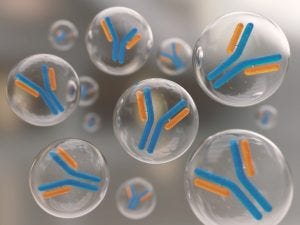
Antibodies must be developable and manufacturable say FairJourney and Iontas, the latest partnership aiming to bring a therapy against COVID-19 to fruition.
Recently we published a comprehensive guide to all the antibody-based therapies being developed to treat COVID-19, caused by the novel coronavirus (SARS-CoV-2).
The latest firms looking to this modality in the battle against the virus are UK-based biotech Iontas and Portugese contract research organization (CRO) FairJourney Biologics, which announced a partnership to combine the latter’s phage display antibody libraries with the former’s next generation Mammalian Display technology.

Image: iStock/anusorn nakdee
The aim is to isolate highly specific, neutralizing SARS-CoV-2 antibodies displaying high affinity and preferential biophysical characteristics without the need for additional optimization in order to risk development delays and manufacturing scale-up problems.
“We are able to apply the speed and flexibility of biotech with unique technology platforms such as mammalian display,” Maria Pajuelo, CSO at FairJourney, and Neil Butt, CBO at Iontas, told Bioprocess Insider. “Further to this, we have amalgamated the efforts of two leading antibody discovery teams, bringing in expertise probably unrivalled elsewhere.”
According to the firms, speed is key to identifying high affinity antibody that results in a potent neutralization of the virus.
“Moreover, we should identify not one, but several antibodies recognizing different functional SARS-CoV-2 epitopes to overcome potential future mutations in the virus, the well-known escape mechanism,” we were told.
“At the end of the day such antibodies must be developable and manufacturable, many antibodies fail in the transition from research data to large scale manufacturing. The approach we have developed should mitigate significant risk in this transition.”
FairJourney and Iontas are, in a traditional sense, competitors. But with the COVID-19 crisis upon us, lessons must be learnt. “Speed is imperative, but combining the efforts of the best scientists – whether they compete with each other or not – will also be pivotal,” the firms told us.
“We should also focus on the long term once the immediate need is over and look to generate antibodies that will cross react with other related coronavirus members to have a generic treatment for other potential coronavirus pandemics.”
Antibodies, vaccines, and small molecules
The number of antibody-based programs targeting COVID-19 sits at around 20 disclosed projects, all of which remain in the discovery and preclinical stage.
The number of preventative vaccines being developed is much higher. Already the likes of Moderna and Inovio have entered the clinic, while J&J has laid plans to produce millions – if not billions – of doses of its potential prophylactic. Simultaneously, small molecule antivirals are racing through the clinic, while the anti-malarial drugs hydroxychloroquine and chloroquine are being tested in Phase III trials.
Vaccines and small molecules have traditionally been produced at much lower costs than antibody products. For example, the wholesale cost of a chloroquine tablet costs under a cent.
But according to Pajuelo and Butt, the immediate need for a treatment, rather than a longer-term preventative measure, is apparent. Meanwhile, antibodies are a great way of generating highly specific treatments that do not confer toxicities often associated with small molecules.
“With regard to costs, the aim of using mammalian display is to reduce development times, by discovering antibodies that can be developed quickly and without the need for time intensive re-engineering. These benefits result in the potential to grow large batches of antibodies at high concentration. This can mean more doses per manufacturing run thereby dropping treatment costs significantly.
“Vaccines will obviously be a long term preventative measure, and if a vaccine can be found that is broadly cross reactive, this will be a significant step in reducing the pandemic risk in future pandemics. However, a vaccine does not encompass treatment of those already infected and, in the future, those developing disease where individuals may not have been vaccinated. In these cases, treatment will be an important step in recovery.”
About the Author
You May Also Like

schedl_b_and_w.jpg?width=100&auto=webp&quality=80&disable=upscale)
schedl_b_and_w.jpg?width=400&auto=webp&quality=80&disable=upscale)


